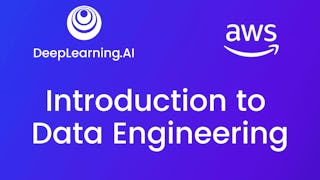Filter by
SubjectRequired
LanguageRequired
The language used throughout the course, in both instruction and assessments.
Learning ProductRequired
LevelRequired
DurationRequired
SkillsRequired
SubtitlesRequired
EducatorRequired
Explore the Computer Engineering Course Catalog
 Status: Free Trial
Status: Free TrialUniversity of Colorado Boulder
Skills you'll gain: Control Systems, Process Control, Embedded Systems, Electronic Systems, Machine Controls, Embedded Software, Programmable Logic Controllers, Electronics, Hardware Design, Automation Engineering, Laboratory Experience, Electronics Engineering, Electrical Engineering, Three-Phase, Power Electronics, Manufacturing Processes, Electrical Equipment, Manufacturing and Production, Electronic Components, Electrical Systems

University of Colorado Boulder
Skills you'll gain: Image Analysis, Computer Vision, Computer Graphics, Deep Learning, Data Ethics, Computational Thinking, Artificial Intelligence, Data Processing, Linear Algebra, Probability Distribution

The University of Tokyo
Skills you'll gain: Visualization (Computer Graphics), Interactive Design, Computer Graphics, Computer Graphic Techniques, Human Computer Interaction, Animation and Game Design, User Interface (UI), Design, Technical Design, Algorithms, Simulations
 Status: Free Trial
Status: Free TrialDeepLearning.AI
Skills you'll gain: Data Pipelines, Data Architecture, Requirements Analysis, Amazon Web Services, Data Warehousing, Data Processing, System Requirements, Extract, Transform, Load, Performance Tuning, Security Controls, Cloud Computing, Data Transformation, Scalability
 Status: Free Trial
Status: Free TrialSkills you'll gain: Strategic Thinking, Digital Transformation, Business Strategy, Cloud Computing Architecture, Competitive Analysis, Cloud Services, Large Language Modeling, Artificial Intelligence, Business Transformation, Cloud Security, Cloud Infrastructure, Big Data, Cloud Platforms, Data Analysis, Statistical Analysis, Cloud Hosting, Cloud Engineering, Generative AI, Product Lifecycle Management, Business Technologies

Georgia Institute of Technology
Skills you'll gain: Chemistry, Chemical Engineering, Manufacturing Processes, Mechanical Engineering, Engineering, Process Engineering, Physical Science, Semiconductors
University of Manchester
Skills you'll gain: Chemical Engineering, Environmental Engineering, Maintenance, Repair, and Facility Services, Engineering, Electrical Systems, Engineering Design Process, Failure Analysis, Civil Engineering, Industrial Design, Engineering Calculations, Chemistry, Environmental Issue, Laboratory Testing
 Status: Free Trial
Status: Free TrialMultiple educators
Skills you'll gain: Dashboard, Pseudocode, Jupyter, Algorithms, Data Literacy, Data Mining, Pandas (Python Package), Correlation Analysis, Web Scraping, NumPy, Probability & Statistics, Predictive Modeling, Big Data, Automation, Data Visualization Software, Data Collection, Data Science, GitHub, Machine Learning Algorithms, Unsupervised Learning
 Status: Free Trial
Status: Free TrialUniversity of California San Diego
Skills you'll gain: Interaction Design, Usability, Human Centered Design, Mockups, Storyboarding, User Experience Design, Design Thinking, Prototyping, User Interface (UI) Design, User Research, Interviewing Skills

Georgia Institute of Technology
Skills you'll gain: Structural Analysis, Probability & Statistics, Structural Engineering, Hydraulics, Statistical Methods, Statistics, Engineering Analysis, Mechanical Engineering, Probability, Engineering, Probability Distribution, Mechanics, Engineering Calculations, Civil Engineering, Applied Mathematics, Algebra, Advanced Mathematics, Calculus, Differential Equations, Geometry

École Nationale des Ponts et Chaussées
Skills you'll gain: Environmental Engineering, Environment Health And Safety, Civil Engineering, Transportation Operations, Construction, Market Dynamics, Transportation, Supply Chain, and Logistics, Material Handling, Chemical Engineering, Product Testing, Technical Standard, Performance Testing, Manufacturing Processes, Laboratory Testing

Georgia Institute of Technology
Skills you'll gain: Structural Analysis, Structural Engineering, Engineering Analysis, Mechanical Engineering, Mechanics, Engineering
Computer Engineering learners also search
In summary, here are 10 of our most popular computer engineering courses
- Embedding Sensors and Motors: University of Colorado Boulder
- Introduction to Computer Vision: University of Colorado Boulder
- Interactive Computer Graphics: The University of Tokyo
- Introduction to Data Engineering: DeepLearning.AI
- IBM & Darden Digital Strategy: IBM
- Material Processing: Georgia Institute of Technology
- Protecting the World: Introducing Corrosion Science and Engineering: University of Manchester
- Data Science Foundations: IBM
- Human-Centered Design: an Introduction: University of California San Diego
- Fundamentals of Engineering Exam Review: Georgia Institute of Technology











